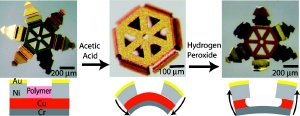Jan 13 2009
In a finding straight out of science fiction, chemical and biomolecular engineers in Maryland are describing development of microscopic, chemically triggered robotic "hands" that can pick up and move small objects. They could be used in laboratory-on-a-chip applications, reconfigurable microfluidic systems, and micromanufacturing, the researchers say. A report on their so-called "microgrippers" is in the December 3, 2008 issue of the Journal of the American Chemical Society, a weekly publication.
 Engineers have developed tiny, robotic hands -- also known as microgrippers (above) -- that could be used in lab-on-a-chip applications. Credit: American Chemical Society.
Engineers have developed tiny, robotic hands -- also known as microgrippers (above) -- that could be used in lab-on-a-chip applications. Credit: American Chemical Society.
In the new study, David Gracias and colleagues note that researchers have long sought to develop chemically triggered microscopic devices that can manipulate small objects with precision. Chemical actuation occurs in biological machinery and enables autonomous function in nature with high specificity and selectivity. Although other scientists have made experimental "grippers" in the lab, these devices generally require the use of batteries and wiring, making them hard to miniaturize and maneuver in small spaces and convoluted conduits.
The researchers describe development of tiny metallic microgrippers shaped like a hand that work without electricity. The grippers are about 0.03 inches wide when open — smaller than the diameter of a grain of sand and made from a gold-coated nickel "palm" joined by six pointy metallic "fingers." The addition of certain chemicals triggers the hands to open or close. In laboratory studies, the scientists demonstrated that the grippers could grasp and release tiny pipes and glass beads and transport these objects to distant locations with the aid of a magnet, showcasing their potential for pick-and-place operations that are ubiquitous in manufacturing, they say.
They also say that this demonstration is also a step toward the development of Micro Chemo Mechanical Systems (MCMS) in contrast to the already well established field of Micro Electro Mechanical Systems (MEMS); the main difference being that the tools are triggered by chemistry as opposed to electricity.